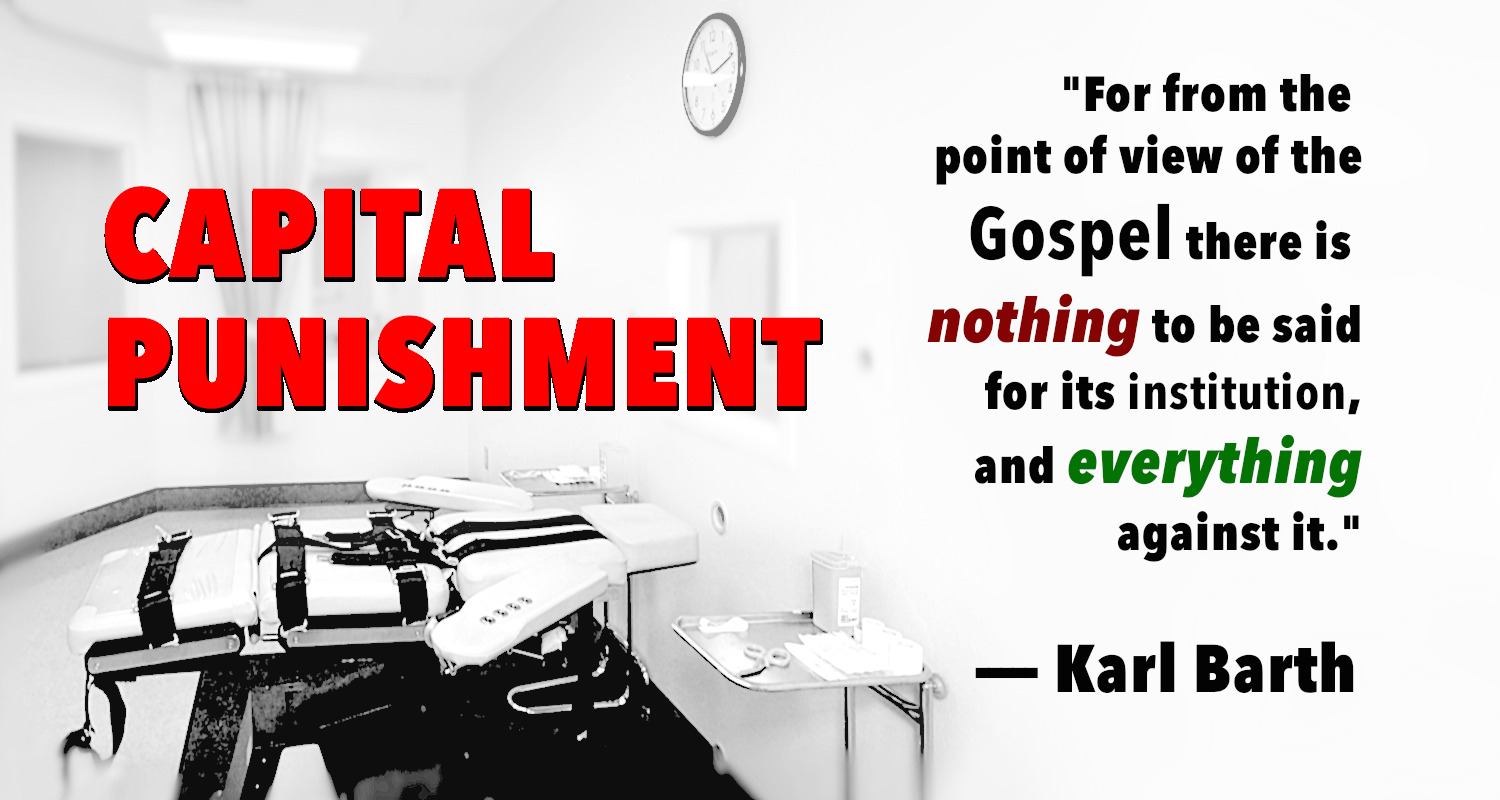
How may any Christian support capital punishment, with the knowledge that Jesus Christ had died for their sins? (1 Corinthians 15:3) Karl Barth argues that it is an astonishing fact that the Church has not unilaterally opposed the death penalty worldwide, and that after two millennia of Church history and a half millennia since the Protestant Reformation, there remains Christians who support this horrific injustice. Karl Barth calls upon the universal church to protest all forms of capital punishment and reminds us it is not too late for the gospel to liberate the captives on death row. (c.f. Luke 4:18).
Karl Barth on the three arguments for capital punishment
It is difficult to fathom how anyone would support the death penalty after the death of Christ Jesus. In the Church Dogmatics III/4, Karl Barth summarizes the three deficient reasons used historically to justify capital punishment. I will summarize them, and then provide Karl Barth's critical response.
Argument #1: Capital punishment protects society from crime by imposing dreadful consequences.
"According to the first theory, which is not only the oldest and most primitive but also the most obvious and impressive, the purpose of punishment is to protect society and the individuals united in it against the criminal and possible imitators of his action by effectively removing the former in some gentler or more drastic fashion, by thus preventing him from further wrongdoing, and at the same time by setting a dreadful example before the latter in order to teach them that such acts are not worth while." [1]
Argument #2: Capital punishment is the retributive justice of God for the victimized by punishing the victimizer.
"According to the second and more profound theory, punishment is meted out because the committed violation of the law objectively demands a retribution or expiation which must fall on the criminal himself, and this in such a way that he himself is more or less severely restricted in the enjoyment of his rights according to the measure in which he has offended against the rights of others or of society. Punishment is, as it were, a representation and proclamation in human and earthly terms of the retributive justice of God." [2]
Argument #3: Capital punishment is a pastoral action to compel a criminal to repent by confronting them with an immediate termination of their life.
"According to the third theory, originated and first held in modern Europe and America, the criminal is punished in order to bring him to an acknowledgement of his error, and to incite him to future amendment, by drastically confronting him with the nature of what he has done in the form of what is now done to him. Punishment thus has a moral, pedagogic and even pastoral purpose." [3]
Karl Barth's argument against capital punishment
Karl Barth's argument against capital punishment is contained within the Church Dogmatics III/4: §55.2 "The Protection of Life", where Karl Barth argues that governments exist for the protection of life of society based upon the commandment "Thou shalt not kill" and reiterated in the New Testament often (c.f Matt 26:52, 2 Thess 2:6, etc.), and embodied by the death of Jesus Christ as a criminal, among criminals, for the sins of the world. Barth argues that the three reasons for capital punishment (listed above) have not been effective in this endeavor, and has not protected the life of society on the whole, and in particular cases caused the wrongful death of many, neither as a deterrent (Argument #1), act of justice (Argument #2), or call to repentance (Argument #3).
Barth's following quotation from "The Protection of Life" is an sample from Karl Barth's full argument against capital punishment in CD III/4:
"If the command to protect life is accepted and asserted in some sense in a national community, then it is impossible to maintain capital punishment as an element in its normal and continuing order. It is astonishing and disturbing fact that for nineteen hundred years there has been a Christian Church, and for four hundred a Protestant, which has not only failed to champion this insight but has continually opposed it. And it is one of the disconcerting blessings of the divine overruling of history that nevertheless it has been very widely accepted, being adopted far more readily and energetically by the children of the world than by the children of the light. But the dreadful abuse of capital punishment which has become rampant again during the last decades in the very heart of Europe, and in a form far exceeding the atrocities of the 16th and 17th centuries, is a clear indication that even the children of the world have not renounced this weapon quite so completely as might have appeared at the height of the 19th century. It is not too late, therefore, for the Christian Church to espouse this renunciation on a worldwide scale. It had every reason to do so from the very first on the basis of its central message, and if it is really true that Liberal opposition to the death sentence was too superficial to be finally adequate and effective, there is no reason why the Church should continue to hide its light under a bushel in this respect. For from the point of view of the Gospel there is nothing to be said for its institution, and everything against it." [4]
Sources:
1. Karl Barth, Church Dogmatics III.4, Section 55.2, pg440 [http://books.google.com/books?id=kdvwyA4nVtkC&lpg=PP1&pg=PA112#v=onepage&q&f=false]
2. Barth. Ibid.
3. Barth. Ibid.
4. Karl Barth, Church Dogmatics III.4, Section 55.2, pg445-6 [http://books.google.com/books?id=kdvwyA4nVtkC&lpg=PP1&pg=PA117#v=onepage&q&f=false]



Leave a comment